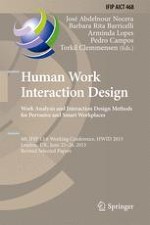2015 | OriginalPaper | Buchkapitel
Reflections on Design-Based Research
In Online Educational and Competence Development Projects
verfasst von : Rikke Ørngreen
Erschienen in: Human Work Interaction Design. Work Analysis and Interaction Design Methods for Pervasive and Smart Workplaces
Aktivieren Sie unsere intelligente Suche, um passende Fachinhalte oder Patente zu finden.
Wählen Sie Textabschnitte aus um mit Künstlicher Intelligenz passenden Patente zu finden. powered by
Markieren Sie Textabschnitte, um KI-gestützt weitere passende Inhalte zu finden. powered by
